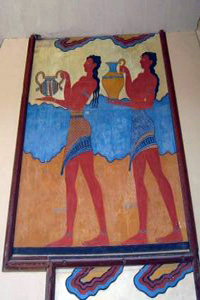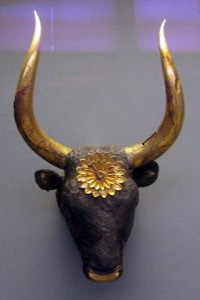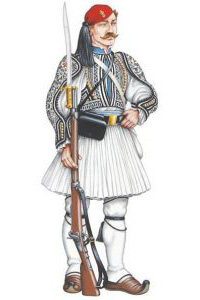GREEK HISTORY
Strategically located between three continents, Greece was vulnerable to invaders and occupiers throughout most of its history. With foreigners a constant presence on Greek soil, it is no wonder that the Greek word for hospitality is “friend of strangers.”
MAJOR EVENTS IN
GREEK HISTORY
In or about 1500 BC, the volcano of Santorini exploded, scientists believe with the energy of several hundred atomic bombs in a fraction of a second. It caused the end of the Minoan Empire in Crete. Many believe the land to have been the lost city of Atlantis.
According to Herodotus, the Trojan War took place 1250 BC when King Agamemnon of Mycenae led the Greek coalition of city-states. Most of the war was actually a prolonged siege which could not break through Troy’s mighty defensive walls. Odysseus’ ruse, a wooden horse with soldiers inside, led to the fall of Troy and the axiom of caution, “Beware of Greeks bearing gifts.”
In 490 BC, Persia, the superpower of its day, invaded Greece with 25,000 troops who, with one exception, had never been defeated in battle. Greece was still a backwater yet, although outnumbered three to one, the Greeks defeated the Persians at the Battle of Marathon with 6400 Persian dead and 192 Greek deaths.
Ten years after the Battle of Marathon, in 480 BC the Persians returned to Greece under Xerxes and engaged the Greeks at sea in the Battle of Salamis. Once again, despite outnumbered, the Greeks out-manoeuvered the Persians and sent them fleeing back to Asia Minor never to return again. The Salamis naval battle changed the course of Western Civilization.
In 334 BC the exceptional leader Alexander the Great, along with 40,000 of his men and his famous horse Bucephalus, entered Asia Minor. Showing amazing military prowess he conquered Syria, Palestine, Egypt, Mesopotamia, Persia, India and even reached Afghanistan. During his awesome eleven-year journey of conquest—unparalleled in the history of the world—he rode more than 10,000 miles and fought 70 battles without losing a single one.
The Roman Emperor Nero was infatuated with all things Greek. In 67 AD, he participated in the Olympic Games by entering the four-horse chariot race with a team of ten horses. He fell out of the chariot and didn’t finish the race, but the judges still awarded him the top prize due to his formidable bribery skills. Nero returned to Rome with a cache of 1,808 first-place prizes from Greek sporting events.
Christianity struggled to assert itself in the early Byzantine years because people were still attached to Roman and Greek pagan gods. A series of laws were passed to force them to give up their rituals and beliefs. In 435 AD, Theodosius II decreed the death penalty for pagans who practiced sacrifices and all shrines, temples and sanctuaries were ordered destroyed.
When the Crusaders were forced to flee Jerusalem, on August 15, 1309, the Knights of St. John set up their headquarters in Rhodes after conquering the locals. In 1522, the Ottoman Empire successfully laid siege on Rhodes and the Knights were forced to relocate again, eventually to Malta.
On October 7, 1571, Christians from all over Europe (including Miguel Cervantes, author of Don Quixote) stopped the Ottomans from conquering Europe at the Battle of Lepanto. Located in the Gulf of Corinth in present day Nafpaktos, Lepanto was the last major naval battle in the Mediterranean fought entirely between galleys (rowed ships).
On March 25th, 1821, after four centuries of Ottoman occupation, the Greek War of Independence began in Patra when a bishop raised the Greek flag at a monastery. Revolts against the Turks arose in the Peloponnese and the Aegean islands by determined guerrilla fighters, including Laskarina Bouboulina, a female who paid for and commanded her own fleet and fought the Turks in naval battles.
On October 28th, 1940, Mussolini demanded Greek Prime Minister Ioannis Metaxas to allow the Italian army free passage to enter and occupy strategic sites in Greece unopposed. The laconic response: “Oxi” which is “no” in Greek. The Italians invaded anyway in the northern Pindus Mountains region but they met fierce resistance by Greek guerillas. Today October 28 is celebrated as Oxi Day, a national holiday.
On November 15, 1973, Greek students at the Athens Polytechnic rose up against the military dictatorship in a popular anti-junta uprising which resulted in state violence on November 17th. The revolt helped lead to the restoration of democracy in 1974 after seven years of military dictatorship. November 17 is currently observed as a holiday in Greece for all educational establishments.
On June 12, 1975, the Greek State applied for admission in the European Union and joined the EU on January 1, 1981. In light of the fact that no citizen voted on this move, it is fair to say that there is controversy among Greeks over its membership in the EU with many citizens wishing the country had never submitted its sovereignty to a higher authority, while others see Greece’s survival as closely connected with a united Europe.
In October, 1981, beloved actress and cultural icon Melina Mercouri was named Minister of Culture. From this perch, she campaigned for the restoration of the Parthenon Marbles from Britain, spearheaded the pedestrian walkway around the Acropolis, introduced free access to Greek museums and archaeology sites for Greek citizens to know their history and promoted Greek cinema, among many of her achievements.
On August 13, 2004, the opening ceremony was held for the 2004 Athens Olympics. By all measures the Athens games were deemed a success. The hosting, however, was a bit bittersweet for Greeks as they were denied host status in 1996 when the world celebrated the 100th anniversary of the first modern Olympics in 1896 in which Greece was the original venue. Many feel, particularly in light of recent scandals, that the Olympics Games should be held permanently in Greece.
 Minoan Empire 3650-1400 BC
Minoan Empire 3650-1400 BC
Centered in Crete, the peaceful Minoan empire was Europe’s first civilization. King Minos’ chair is replicated at the International Court of Justice in The Hague. The Minoans relied on extensive maritime trading to build their empire. It was so grand and advanced that there were flush toilets in the four greatest palace cities – Knossos, Phaestos, Malia and Zakros. Crete is the origin of the labyrinth, a complex maze built in many place today for meditative walks. The Minoan empire ended around 1100 BC with the eruption of a volcano on Thira, modern day Santorini.
 Cycladic Culture 300-1450 BC
Cycladic Culture 300-1450 BC
The big news here is Goddess Worship! This early period was characterized by a pastoral lifestyle, small villages and honoring female deities. The region’s perfect climate — warm with a dry wind and sea breezes — was no doubt a key factor in the gravitation of early peoples to Greece. The Phoenicians were most likely the first settlers. Sea faring was a necessary activity for the islanders, scattered as they were. Cycladic ships became the prototypes in which Greece would plant its colonies as early as the 6th century BC throughout the Mediterranean.
 The Mycenae Empire 1900-1100 BC The Mycenaean civilization rose as the Minoan civilization declined. The kings of this Peloponnese-based empire lived in elaborate palaces and were buried in stately “beehive” tombs. They greeted the underworld wearing enigmatic gold masks. Who has not heard of its most mighty resident, King Agamemnon who attacked Troy? The Mycenaean Linear B script offered the first written record of the Greek language. The Mycenaeans disappeared after the Dorian invasion which ushered in Greece’s so-called “dark age.”
The Mycenae Empire 1900-1100 BC The Mycenaean civilization rose as the Minoan civilization declined. The kings of this Peloponnese-based empire lived in elaborate palaces and were buried in stately “beehive” tombs. They greeted the underworld wearing enigmatic gold masks. Who has not heard of its most mighty resident, King Agamemnon who attacked Troy? The Mycenaean Linear B script offered the first written record of the Greek language. The Mycenaeans disappeared after the Dorian invasion which ushered in Greece’s so-called “dark age.”
 Archaic Age 800-480 BC
Archaic Age 800-480 BC
The creative innovations in the Archaic era set the stage for Greece’s stunning contributions to Western civilization which emerged in full glory during the Classical Age. In the Archaic Age the population increased massively and major developments took place: the birth of the Greek alphabet, Homer’s morality epics, pan-Hellenic athletic competitions such as the Olympic Games, the pagan sanctuary at Delphi whose administrators were chosen from each city-state but remained neutral in their role, making this body in some respects a prototype of the United Nations.
 The Classic or Hellenic Period 480-323 BC
The Classic or Hellenic Period 480-323 BC
For only about 200 years, a speck of time in history, Greece flourished to produce the hallmarks of Western Civilization in every field imaginable: Medicine – Hippocrates. Drama – Sophocles, Aristophanes, Euripides. Democracy & Law – Perakles, Solon. Mathematics & Astronomy – Pythagoras. Philosophy – Socrates, Plato, Aristotle. Physics – Archimedes. Sculpture – Praxiteles. Architecture – Phidias (Acropolis). In 480 BC when the outnumbered Greeks defeated the Persian army, the victory imbued the Greeks with an enormous inner confidence to go on to build a great civilization. The period lasted roughly until Alexander the Great’s murder in 323 BC.
 Roman Rule 146 BC – 330 AD
Roman Rule 146 BC – 330 AD
The Romans triumphed and took Corinth in 146 BC and then Sulla conquered Athens in 88 BC, ushering in 300 years of Roman rule. The pragmatic Romans borrowed heavily from Greek culture, philosophy, the sciences and art. Wealthy Romans frequently sent their children to Athens for their education. The Romans, with their vast empire, helped spread Greek culture far and wide. Although there were wars, the eventual Pax Romana was the longest period of peace in Greek history. The Roman era ended when the capital of the Roman Empire in 330 AD became Byzantium a/k/a Constantinopoli a/k/a Istanbul.
 Byzantine Empire 325 – 1054 AD
Byzantine Empire 325 – 1054 AD
With St. Paul’s mission to Greece in the first century AD, Christianity started to slowly spread throughout the Greek world. It got a boost in 325 AD when the Roman emperor Constantine I converted and moved the capital from Rome to Byzantium (aka Constantinople, modern day Istanbul). Christendom remained united until 1054 when the theological differences between the Eastern and Western churches split. As a result the Greek Orthodox Church has its patriarchs and the Roman Catholic Church has its popes.
 The Turkish Occupation and the Greek War of Independence 1453 – 1823
The Turkish Occupation and the Greek War of Independence 1453 – 1823
When the Turks ejected the Byzantine Empire in 1453 from the region, the local inhabitants, including its Greek citizens, were incorporated into the Ottoman Empire. Greek life under 400 years of Turkish occupation was oppressive and humiliating. The Greek cause created a feeling of philo-Hellenism from foreigners all over Europe. Many came to Greece to fight or support the War of Independence, including Lord Byron who died in Greece. Believing passionately in their cause, the Greeks fought fiercely and by 1823 the Sultan finally ceded control of the Greek nation to the Greek people.
 Turkey and the Great Catastrophe 1920s
Turkey and the Great Catastrophe 1920s
Until 1922 there was a thriving Greek community in Smyrna (now Izmir). Greeks had lived there for centuries as this area was part of ancient and Byzantine Greece. In 1922 thousands of Greek Smyrnans were decimated by the forces of Mustafa Kemal, founder of the modern Turkish state. Those who survived the massacres were forcibly relocated to Greece where many had never lived nor spoke Greek. Greece, at that time a small country of less than 5 million, struggled to absorb 1.5 million refugees, including Aristotle Onassis who escaped from Smyrna almost penniless.
 World War II and the Greek Civil War 1940s
World War II and the Greek Civil War 1940s
In the first year of Germany’s occupation of Greece in 1941 over 100,000 Greeks died of starvation. Death rates reached the point where Orthodox burial traditions had to be abandoned. This was a tremendous psychological shock to a deeply religious population with intense superstitions regarding improper burials. Over 80% of the nation’s industry was destroyed. In 1944, after the occupation ended, the country descended into civil war as Russian backed communists fought right wing fascist elements backed by the United States. The rivalries created brutal relations and murders between towns and even amongst family members. To this day, traces of the bitterness exist in pockets of the Greek population.
 The Military Coup and Cyprus 1967-1974
The Military Coup and Cyprus 1967-1974
On April 21, 1967, Greece’s democracy was overthrown by a group of colonels opposed to the socialist leaning government. The junta imposed martial law on the country. Trade unions were banned, leftists were imprisoned and tortured and the media subject to rigorous censorship. The military obeyed a CIA inspired scheme to unite Cyprus and Greece by assassinating the Cypriot president. The plan failed and Turkey invaded Northern Cyprus which it continues to unlawfully occupy today. After seven years of military dictatorship, Greece transitioned to democracy.
 Contemporary Greece
Contemporary Greece
Greece became a member of the European Union on January 1, 1981. Civil marriages were established, the obligatory dowry was abolished and abortion was legalized. On March 1, 2002 the euro was introduced and the world’s oldest currency, the drachma, ceased to exist. In preparation for the 2004 Olympic Games Greece’s infrastructure was significantly upgraded. Since 2009, the Greek debt crisis rocked the country and continues to impact daily life, although foreigners are not likely to see the effects because Greek hospitality always makes a guest feel welcome and at ease.






